|

Sir Geoffrey Mander |
Sir Geoffrey Le Mesurier Mander (1882-1962)1
was a Midland industrialist, an art collector and impassioned
parliamentarian, the Liberal specialist on foreign policy
between the wars. From a nonconformist and radical background,
he held a strong patrician sense of public service and
philanthropy. As a politician he was a man of integrity, ahead
of his time, who spoke up as an anti-Appeaser and a crusader for
the League of Nations between the wars. He made a reputation as
an oppositionist, for his determined use of parliamentary
questions; a gadfly who never spared to wing into the attack
whenever sloppy thinking and deceit threatened to obscure the
issues of the day. He represented Wolverhampton East from May
1929 to the fateful 1945 landslide.
Geoffrey Mander came from a strong liberal tradition. The
Mander family were in the vanguard of the industrial revolution
in the
Midlands.2
|
| From 1773 they established in Wolverhampton a
durable cluster of businesses as manufacturers of chemicals,
gas, japanware and (mostly successfully) varnish, paint and
printing ink. By 1815 they were varnish manufacturers by
appointment to Queen Charlotte. By 1827 they already operated
'one of the largest chemical elaboratories in the kingdom',
trading from China and the East Indies to the Americas. As the
business prospered with the industrial revolution, they became
established as the varnish kings of the Empire, and were given
the means and leisure to become active and progressive
philanthropists.
In the early nineteenth century, they campaigned against the slave
trade, lobbied for the reform of the criminal code, and set up a union
mill to provide cheap flour and bread in the difficult aftermath of the
Napoleonic wars. Four Manders at the same time were Town Commissioners
in Georgian Wolverhampton. They pursued a 22-year chancery suit for the
protection of non-conformist chapels and endowments, a test case which
was heard by the lord chancellor Eldon and was to lead to an act of
Parliament by 1844. In 1817, Charles Mander rode to London to petition
the home secretary, Sidmouth, for the reprieve of two innocent soldiers
condemned to death for stealing a shilling coin. It was a romantic
incident which appealed to the imagination of contemporaries and became
the inspiration of a forgotten Methodist novel by Samuel Warren.3
It led with the help of Samuel Romilly in Parliament (the Manders' first
counsel in their litigation) to the repeal of the Blood Money Act
(1818), 'one of the worst acts ever to disgrace the Statute Book'. The
family founded chapels, fountains, free libraries and schools, and
became progressive mayors, filling nearly every public office in the
county. Geoffrey's younger brother, the Hollywood actor and novelist
Miles Mander (who married an Indian princess), summarized the background
writing 'to [his] son in confidence' (1934): |
|
The Manders have nobly vindicated themselves. At the time of writing,
they have produced one baronet, one Member of Parliament, High Sheriffs,
Deputy Lieutenants and several of the lesser municipal dignitaries such
as Mayors, Magistrates and Councillors. In fact, we are quite obviously
worthy people… Your Canadian great-grandfather was in the Ottawa
Parliament, your grandfather, Theodore, was one of the most prominent
Liberals of his day, your Uncle Geoffrey is at present a Liberal Member,
and I am hoping to be in the House shortly myself.4 |
Geoffrey Mander was the eldest son of Theodore Mander (1853-1900), a
Gladstonian Liberal and strict Congregationalist. Theodore married Flora
Paint, a Canadian from Nova Scotia of Guernsey extraction (from whose
forebears Geoffrey derived his second name), whose father was himself,
as Miles states, MP for Richmond county in the Dominion Parliament in
the 1880s. Theodore was a man of refined tastes and sympathies, a
collection of whose diaries and letters was published in 1993 as
A Very Private Heritage.5
He is remembered today as the builder of Wightwick Manor (1887-93), a
half-timbered aesthetic house of exquisite craftsmanship and detailing,
with outstanding William Morris furnishings and pre-Raphaelite
collections.

A family group at
Wightwick in about 1898. Left to Right:
Marjorie, Theodore, Lionel, Flora, Alan, Geoffrey. |
Theodore in own his day was known as a Liberal and philanthropist. As a
young man, he was active in public life in the arts and education, as a
governor of the Grammar School, of Tettenhall College and of Birmingham
University (where he endowed a scholarship), a member of the Royal
Commission of the British Section of the Paris Exhibition and one of the
founding benefactors of Mansfield College, Oxford, which was the first
nonconformist college in the University. He described Henry Fowler,
first viscount Wolverhampton, as 'his political mentor', chairing his
election committee. In June 1895, he was offered the Mid-Worcester seat
in Parliament. William Woodings of The Midland Liberal Federation wrote
to him: 'Your name would be well known and you have almost a local
connection… The constituency is Liberal in tendency and is not difficult
to work.' He was still committed to municipal affairs, and didn't live
long enough to contest the seat. He was a successful mayor of
Wolverhampton at the turn of the century, he was presented to Queen
Victoria and entertained the Duke and Duchess of York at Wightwick. But
he died in office a few months later, in 1901, following an operation on
his kitchen table. He was aged just 47.
|
|
Geoffrey was 16, and still at Harrow at the time of his father's death.
His mother Flora died soon after, in 1905, leaving him to assume the
responsibilities of his father's estate early. He was a prickly,
cross-grained youth, described by the paterfamilias, his father's
cousin, the staunch Tory Sir Charles Tertius Mander, as
'an impossible young cub… It is time we brought him up with a round
turn… he is very self opinionated, has no judgment or tact & is much too
big for his boots, & has been ever since his father died.' |
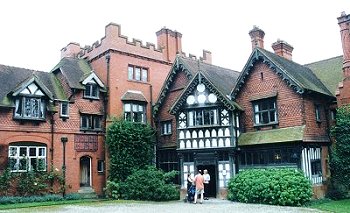
Wightwick Manor - The main entrance. |
He went up to Trinity, Cambridge, where he followed family tradition by
reading Natural Sciences. At Cambridge, he soon continued in the mould
of public service, now with a radical slant. He joined the Union and the
University Liberal League, and
'a thing called the Cambridge University Association for promoting
Social Settlements. I have not the remotest idea what it's about, but I
hope it's not socialism'. He founded a dining and debating club
called 'The Dabblers'. Stephen Ponder writes:
|
From an early age he had a strong sense of social responsibility and
interest in public life… He was typical of a particular sort of English
radical, a man of wealth and position who devoted himself to public
service, supporting and proposing measures at odds with his background
and private interests.6 |
Like most members of the family, he became a magistrate, in his case at
the age of 24, and in due course Chairman of the Bench, serving for 50
years. By the time of the Kingswinford by-election in 1905, the press is
describing him as 'a Liberal member of a distinguished local
Conservative family'. He supported the Labour candidate for West
Wolverhampton in the 1906 election against a family friend, Sir Alfred
Hickman. He wrote later:
'My action caused great indignation in Conservative circles in the
neighbourhood and I found myself cut in the hunting field by some of
them.' His second wife Rosalie described how, like many radicals who
refused to conform to the conventions of the 'County' pattern, he was
looked upon askance by many families. This attitude only changed after
the second world war, 'both because party bitterness in general had died
out and because Geoffrey Mander's sincerity and his devotion to the
causes in which he believed won respect all round':
|
A tolerant 'man of goodwill' himself, who never spoke or acted out of
malice or spite, he was glad of this development and appreciated being
invited to social functions in the neighbourhood-more perhaps than he
enjoyed attending them. |
He cut his teeth as a Liberal member of the Wolverhampton Borough
Council (1911-20). He shocked the Councillors, showing a foretaste of
later interests, when he proposed a minimum wage of 23s. for all
municipal employees. He came out in favour of his cousin Gerald's
campaign to save the Old Deanery, an historic landmark in Wolverhampton
attributed to Christopher Wren. This initiative was frustrated by the
onset of war and the building where Dickens is said to have stayed was
demolished in 1921.
|

The visit of Henry Nicholas Paint, M.P. to
Wightwick. |
He was High Sheriff of Staffordshire in 1921. He again created a stir
when he proposed a woman as his successor, Lady Joan Legge, daughter of
Lord Dartmouth. The Privy Council wrote to her father to inquire whether
she had the necessary property qualifications, and she was not
appointed. But he did secure the selection of the first woman to serve
on the grand jury, Mrs Kempthorne, the wife of the bishop of Lichfield.
He stood unsuccessfully as a Liberal candidate for the
Midland constituencies of Leominster in 1920 and then
Cannock and Stourbridge. In 1929 he finally realized his
early ambition by entering Parliament as Liberal MP for East
Wolverhampton, a seat which had been represented by Liberals
continuously since the Reform Bill of 1832. It included only
three wards of inner Wolverhampton itself (as opposed to
eight in Wolverhampton West), with urban districts and a
cluster of independent surrounding villages. It was an area
where Mander Brothers was dominant, with factories in both
Heath Town and Wednesfield, and many employees of his works
among the voters.
He was active in the Liberal Party organisation from the
early 1920s, as a member of the executive committee of the
National Liberal Federation and a frequent speaker at party
Assemblies. He made a reputation as a parliamentarian by his
skilful use of 'awkward' Parliamentary Questions, cornering
the government of the day with his determined invigilation.
The journalist Percy Cater recorded his memories of:
|
the pinkly pugnacious Mr. Mander waving above the battle of
question-time like the banner of some cause or another, accompanied by
orchestral splurges of derisive laughter or 'Sit down'… one of the
hornets or gadflies who animate the political scene, infuriating the
stung and keeping the unstung in a lively state of tension. Baldwin once
said, in one of those shrewd epigrams which come from him as easily as
blowing the smoke from his pipe, that Mr. Mander would 'tread honestly
and conscientiously on every corn from China to Peru.'
Mr. Mander … is not pompous. A mild and benevolent eye
darts from sandy brows in a face which is conspicuously
equable and good humoured. He is a good, if not a great man.
He is a sort of pocket edition of noble indignation. See him
pouncing up to ask a question. There you see fire, purpose,
an inextinguishable soul.
No good a Baldwin bobbing up and answering Mr. Mander
briefly and completely, 'No, sir,' and rousing shocking
laughter. No good a Chamberlain using the iron hand from
Birmingham. Sharp as a game-cock and as perky, Mr. Mander
dashes in for some more of the fight.
|
|
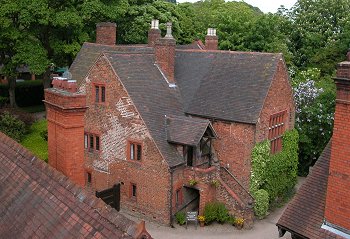
| The Old Manor
House at Wightwick from Wightwick Manor tower. |
|
His special interests in Parliament were industrial relations, on which
he spoke with authority and sympathy as a manufacturer through the
Depression, and foreign affairs. Geoffrey became the Liberal expert on
international relations, peace and disarmament, between the wars and the
most ardent defender of the League of Nations system of collective
security; 'the most persistent speaker and questioner on foreign affairs
in the 1930s and altogether a zealot for the League'.7 |
He was one of the first to foresee the consequences of not taking a firm
stand against the Japanese invasion of Manchuria in 1931. Into a House
of Commons debate mainly devoted to currency, commerce, industry and
tariffs, typically he intruded Manchuria and put forward the League
position:
|
It is a test question. We have to decide whether war is to be permitted…
We have the whole of the League plus America on the one side and Japan
on the other. [I hope the Council for the League would] use all the
moral force they possibly can… and if that were not enough use financial
and economic pressure and, if that will not do, use pressure in the way
of a blockade in preventing goods from going into or coming out of
Japan… We have to take a bold and courageous view and, without using any
physical force-that will not be necessary-mobilise all the different
methods of economic, financial and moral pressure which are available to
force Japan to realise that war is not going to be permitted to break
out again… There is no doubt that, if we fail in this issue, we are
abandoning all the hope that arose out of the war, and the sacrifice of
a million Englishmen, to say nothing of nine million others, who gave
their lives for a great ideal will very largely have been in vain.' 8 |
As war again threatened again in the Thirties, he was one of the first
to speak out against the Dictators. He tabled the International Economic
Sanctions (Enabling) Bill of 17 May 1933, which made him 'one of the
first to call attention to the German danger publicly in Parliament and
at the same time make definite proposals for dealing with it';
supporters included Sir Austen Chamberlain whose 'death in 1937 was a
heavy blow to peace'. The Peace Bill of 23 May 1935 (and subsequently)
incorporated machinery embodied in the Covenant of the League of Nations
for the settlement of international disputes, and was supported by
Harold Macmillan, P. Noel-Baker, Sir Richard Acland and Lovat Fraser,
inter alia.
In the 1935 General Election his comfortable victory against the Labour
and Conservative opposition bucked the trend when the Liberals won only
two other urban seats where they faced competition from both the other
parties. He became a vehement, articulate critic of Neville
Chamberlain's policy of Appeasement, and his 'inability to see what was
going on in the world', an ally of Churchill, Eden and Sinclair, whose
polemical jabs were a wake-up call against a deep-rooted national will
to self-deception. He said that it would remain
'one of the regrets of my life that I did not make some sort of
speech … when Mr. Chamberlain announced his intention of flying to
Munich… If the Debate had been kept up, the spell would have been
broken… Others would have followed and the dangers inherent in what was
happening would have been exposed.'
His polemic was set forth in his book, We were not all Wrong (1941),
arguing that many people and parties foresaw the disaster to which
errors of policy in dealing with 'the Nazi menace' in the 1930s would
inevitably lead:
|
Municheers should never again be allowed to control our destinies. It is
too ghastly to think of the same unimaginative, isolationist, naïve,
complacent attitude, however well meant, being adopted after the war.
Absolute national sovereignty has outlived its usefulness in the world
in which we now live, just as has the Divine Right of Kings internally.
Old loyalties, deep-rooted, historic and admirable, remain… It is our
responsibility as it is in our power in the great adventure we must
lead: England cannot afford to be little, she must be what she is-or
nothing.10 |
A generation later, his son, John Mander, a political journalist and
cultural critic, described the origins of Appeasement. Ironically, he
wrote, in its intellectual perspective it was largely the creation of
liberals of nonconformist background like his father:
|
Evidently … the roots of Appeasement lie deep: they lie in the English
penchant for wishful thinking, they lie in the English easy-goingness
and tolerance, they lie in that insularity which for the greatest part
of our history has been our greatest boon, but which, over the past
century has proved, arguably, our greatest curse.11 |
When Geoffrey spoke up in the House of Commons in support of sanctions
against Italy after the invasion of Abyssinia, Mussolini fired off a
personal diatribe against him in his paper, the
Popolo d'Italia. In 1938, in a climate of international tension,
il duce took reprisals against the Milan branch of 'Fratelli
Mander' and asked customers to boycott their goods.
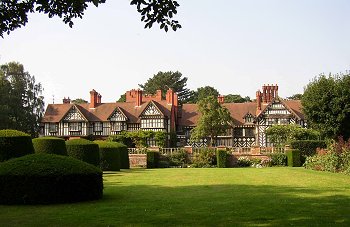
A fine summer evening's view of Wightwick
Manor from
the rear garden. |
He was far sighted in many of his peace campaigns. He was one of a
handful of MPs who inveighed against Hitler's territorial ambitions in
the Ukraine in 1935. As war broke out in 1939, he pleaded the Jewish
cause, telling Parliament in July that Government immigration policy was
leaving Jews with no escape from Germany 'other than by illegal
immigration into Palestine'. In April 1941, he wrote in the Jewish
Standard: 'The cause of the Jews throughout the world is the cause for
which Great Britain and her allies are fighting'.
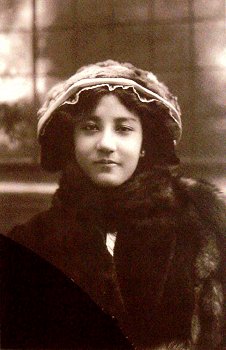
| Princess
Sudhira Mander, who married Alan, Geoffrey's
brother. |
|
|
During the war, when the Liberals were asked to join the government
coalition under Churchill, Geoffrey became Parliamentary Private
Secretary (1942-5) to their leader, Sir Archibald Sinclair (later Lord
Thurso), the Minister for Air.12
Mander Brothers' Heath Town works was marked with a red ring on a
Luftwaffe plan, found after the war, as
'Chemikalien', indicated as a strategic target for bombing. He
rescued various bomb-damaged fragments of the House of Commons from the
Blitz, installing two stone crowns from the pinnacles of Big Ben as
ornaments about the garden at Wightwick. He kept the archives of the
League of Nations Union when they were forced by financial difficulties
to move to smaller premises in the early 1940s.
Wolverhampton East was one of the last urban constituencies that the
Liberals managed to hold against both Labour and Conservative opposition
up to 1945. But he lost his seat in the Labour landslide of that the
1945 General Election and was knighted in the same year (K.B.). His was
a great loss to Parliament. |
Thurso regretted the 'massacre' of so many 'able, experienced and
popular' candidates as he.13
There was a rumour for a time of his being given a peerage, and the
Press proposed he be gazetted with the equivocal title 'Lord Meander',
in commemoration of his tireless crusades and pertinacious questions,
seamless diatribes and string of private member's bills in the House.
|
In 1948 he joined the Labour Party, arguing that it had become the
logical successor of the Liberal tradition in his pamphlet
To Liberals, written for the Labour Party in 1950. In due course
he became a Labour member of the County Council. To many members of a
family whose traditions stretched to radical Whiggery, this was beyond
the pale. But he did say privately, that if he had not lost his seat, he
would have remained a Liberal, and most likely have been appointed chief
whip of the Liberals in Parliament.
Geoffrey Mander the politician was not quite forgotten by an
older generation. The first question Rab Butler asked me when I
followed Cousin Geoffrey to Trinity, Cambridge was, 'How are you
related to that b***er, Geoffrey?'14
My own memories are of a fusty, Edwardian patriarch, small in
stature, with a watch chain, who called in after church with his
political friends like Clem Attlee. Apart from his public
service in politics, his liberalism is vividly exemplified in
his career as an industrialist and an art patron. |
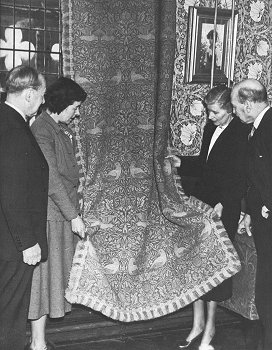
Geoffrey Mander admiring the
Morris 'bird' pattern curtains with the Attlees. |
|
The family company, Mander Brothers, was known between the wars as a
model company. Geoffrey, as the eldest of his generation, was chairman,
while his cousin, Charles Arthur (the second baronet), was managing
director. Sir Charles was 'wet' as a Tory, active in local government
and Midland affairs, and deeply interested in everything that touched
the human side of industry. In Parliament Geoffrey had pushed through
the Joint Industrial Councils and Work Councils Bills. Together they
implemented typically progressive initiatives in industrial welfare, to
foster peace in industry. These included a joint works' council
providing a workable system of joint consultation (1920), a welfare club
(1920), profit-sharing schemes for employees, holiday schemes,
suggestion schemes (1925), works pensions (1928), a house magazine,
staff pensions (1935), and a 'contributory co-partnership scheme'
setting aside shares for employees, with provisions to pay for shares by
instalments.
Most notably, Manders was the first company in the country to introduce
the forty-hour week. The historic agreement, the first of its kind in
Britain, was brokered and signed by Ernest Bevin, general secretary of
the Transport and General Workers' Union, in September 1932. 'Bevin was
very proud of signing that agreement', said Geoffrey later: 'He used
often to refer to it when were both in the House of Commons.' The press
wrote: 'In the history of industrial welfare, Manders may claim a high
place', where welfare had been 'part and parcel of the outlook of
Manders as employers almost since the company's foundation in [1773]'.
Geoffrey was reported summarizing:
|
My ancestors were very religious people. They always used to open the
day's work with prayers and lead hymn-singing at the end of the day.
Those religious principles which coloured their dealings with the then
small number of workpeople were the forerunners of welfare principles as
we know them today. In the history of industrial welfare Manders may lay
claim to a great deal of pioneering work. |
|
|
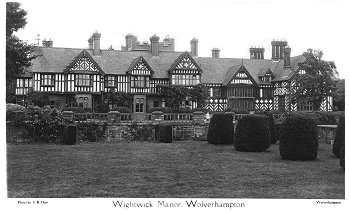
Wightwick: postcard from Geoffrey Mander, 1932
|
As an art patron Geoffrey's contributions to Wightwick Manor have been
his most secure legacy. When his father died young, much at Wightwick
was left undone. But the sequel has been fortunate, for Wightwick is the
creation of two generations. Geoffrey's was a man of vision and ability
whose own contribution was decisive, and shows evolving attitudes at
work in the interpretation of the nineteenth century. |
| His taste was decisive in creating the
ensemble we see today; improving and deepening the
collections, but also the garden. One of his first acts was
in 1910, when, still in his twenties, he was already
commissioning Thomas Mawson to design the garden terrace on
the south side of the house.
He married first in 1906, Florence Caverhill, a Canadian like his
mother. His second marriage in 1930 was to Rosalie Glynn Grylls
(1905-1988).16 She was an early
female graduate of Oxford; elegant, intellectual and talented. Elizabeth
Longford was one of the last to remember this exceptional 'Cornish' girl
at Lady Margaret Hall reading Modern Greats, 'brown eyed, dark haired,
with teeth really like pearls … who went on from strength to strength'.
She described her as amusing and amused, full of anecdotes, a vivacious
speaker, quick thinking and always exquisitely dressed; she was also
'the last of the militant atheists'. Her husband, Frank, who took
schools on the desk beside her, was taken by 'the exceptionally pretty
young girl whose arrival was always heralded by the tap of elegant
shoes'.
|
Like Geoffrey, Rosalie also entered politics, as a prospective Liberal
candidate for Reading, when the Party was enjoying a revival. She was
nearly 20 years younger than he, of course, and was secretary to the
Liberal MP, Edgar Granville. Before the time came for her to face the
electors, she married him in the crypt of the House of Commons. She was
eyed with suspicion as a bluestocking in the wider family. She soon
became known to them, who tended to pious disapproval of divorce and
remained wary of radical politics, as 'The Secretary'. |

Geoffrey and his family.
Children Anthea and John are in the centre, and
Rosalie his wife, the Victorian biographer, is on
the right. |
Rosalie never lost her interest in progressive politics. However, she
went on to pursue her literary interests as a highly-regarded
biographer, lecturer and scholar, particularly of the Shelley/ Godwin
circle and the 'Pre-Raphaeladies'. With her knowledge and encouragement,
Geoffrey began in the 1930s to develop and extend the collections at
Wightwick and they became pioneers and authorities in the overdue
re-assessment of Victorian art. They were among the first collectors to
take a serious interest in the art and literary manuscripts associated
with this late Romantic flowering, coming to know the survivors and
successors of the circle of artists, designers and writers themselves.
Many of them now visited Wightwick, like May Morris in 1938, or
contributed to the collection, like Helen Rossetti Angeli, daughter of
W.M. Rossetti and Lucy Maddox Brown, enriching its associations. They
fostered links with the romantic Utopian socialism preached by William
Morris, and many of the radical politicians and thinkers of the day
visited what became a Midland political fortress.
In December 1937 the future of house and collection was finally secured
when Geoffrey presented it to the National Trust, with an endowment of
20,000 Manders shares. He was encouraged by the Trevelyans ('of another
Liberal and eccentric family', wrote Rosalie, who gave Wallington to the
Trust shortly afterwards) and Professor W.G. Constable.17
Rosalie Mander wrote: 'He never regretted it, for he liked to think
that the public should enjoy what had been his private property.'18
He delighted in showing visitors round the house, and insisted on
keeping no quarters barred from public view; his dressing room and
bathroom included.
Geoffrey had installed a squash court in 1928 and continued to play
tennis there until just shortly before he died aged nearly eighty in
1962. Lord Longford (then Frank Pakenham) wrote in his Times obituary
that he was an 'issue man':
There was never a more selfless politician… Perhaps he should not be
thought of as a politician at all, for all his love of the House of
Commons and the political life. He was supremely a man of causes.
Abyssinia, Czechoslovakia, anti-Fascism, Collective Security-he preached
them indefatigably and inflexibly, though with unfailing good humour,
and what he preached he practised.
He was the most modest of men and would have disclaimed the slightest
comparison with Lord Cecil; yet even Lord Cecil did not embody more
completely the idealism of the League of Nations and all it stood for.
His horror of the whole policy of appeasement culminating in Munich led
him to harry the Government with an endless stream of questions in the
House of Commons, to the irritation of his opponents and the admiration
of his friends.
In all the developments leading up to the establishment of the United
Nations and throughout the years that followed, his staunchness and
energy in the struggle for peace never flagged. It was the greatest of
pities that he was without a seat in either House during the post-war
years. But whether in his own Midlands or in the national and
international politics he continued to find ways of rendering service
that counted.
|
References
|
1. |
The fullest account is a booklet life, prepared by his widow mainly for sale
at Wightwick: R.G.G. Mander, Geoffrey le Mesurier Mander (1882-1962),
Donor of the house, Oxford [n.d.]. He left an autobiographical fragment
(1924-57), in the National Liberal Association archives at Bristol
University Library (DM668). |
|
2. |
For an account, see Geoffrey Mander
(ed.), The History of Mander Brothers [1955] and the
author's own
Varnished Leaves: a biography of the Mander
family of Wolverhampton, 2004 (with bibliography). |
|
3. |
Now and Then, 1848. |
|
4. |
Miles Mander, To my Son-in Confidence, Faber, 1934. Lionel ('Miles')
and his brother Alan both married daughters of the Maharajah of Cooch Behar.
(see Sunitee Devee, Maharani of Cooch Behar, The Autobiography of an Indian
Princess, 1921, pp. 43, 203-4.) |
|
5. |
Pegg, Patricia (ed.), A Very
Private Heritage: The Family Papers of Samuel
Theodore Mander of Wolverhampton, 1853-1900,
Malvern: Images Publishing, 1996. |
|
6. |
Wightwick Manor, National Trust guide, 1993. |
|
7. |
R.A.C. Parker, Chamberlain and
Appeasement, 1993, pp. 40, 52 and 54. |
|
8. |
259 HC Deb 5s, cols 1189, 45, 60, 201-2; Parker, pp. 40-1. |
|
9. |
Geoffrey Mander, We were not all Wrong, 19381941, pp. 87-9. |
|
10. |
We were not all wrong, p. 118. |
|
11. |
John Mander, Our German Cousins, 1974, p. 247. |
|
12. |
Archibald Sinclair (1890-1970), first Viscount Thurso (1951). |
|
13. |
G.J. de Groot, Liberal Crusader:
The Life of Sir Archibald Sinclair, 1993, p.
227. |
|
14. |
The answer, like a four-move chess problem, is that I am his first and second
cousin, twice removed. |
|
15. |
The agreement is quoted verbatim in The History of Mander Brothers.
See also Mander Brothers Ltd.,
An Account of the Internal Organisation of the
Business of Mander Brothers, Ltd., Wolverhampton, In its relationship to the
Employee (Approved by the Joint Works Committee), 1925, revised 1934,
1939, 24 p. |
|
16. |
See obituaries in The Times (4 Nov. 1988); The Daily Telegraph
(in part by Elizabeth Longford, 4 Nov. 1988); and Martin Drury (National
Trust Magazine, Summer 1989). |
|
17. |
Director of the Courtauld Institute, London, and Slade Professor of Fine Art
at Cambridge. Another kindred spirit in the League of Nations, connected
(distantly) by marriage through the Turnbull family, was Roger, ninth Lord
Stamford; the tenth Earl presented Dunham Massey to the National Trust in
1976. |
|
18. |
The Country House Remembered, edited by M. Waterson,
1985. |
|
19. |
J. Orbach, Victorian Architecture in Britain, 1987, p. 440; Martin
Drury, 'Address to the 1999 AGM', Historic House, Spring 2000, p.
13. |

|
Return to the
previous page |
|
|